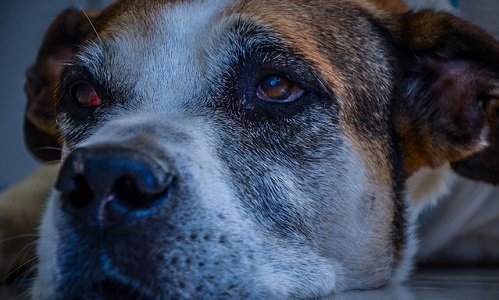It’s a somewhat funny and definitely smelly truth that dogs fart. Sometimes, they fart a lot. If you’ve ever been sitting around the house or cleaning the kitchen, minding your own business, when a foul and odious smell sweeps through the room, then you know what this blog post is about. Unfortunately, you’ve become an unwitting victim of your dog’s (sometimes) silent, and (always) deadly, flatulence.
Of course, your dog’s farts may not always be silent and deadly either. Sometimes they are quite loud, which can be embarrassing if you have company. Who knew dogs could emit such horrendous sounds and noxious odors?
Thankfully, you can rest easy knowing that nothing so dire has happened if your dog is farting a lot. Dogs aren’t any different from humans. They eat food, they have digestive systems, and therefore, they fart. Your dog’s tummy woes are rarely anything more serious than an accumulation of gas trapped in his belly that needed a release.
Like humans, occasional gas is nothing to be concerned about and is, in fact, a natural occurrence. We all pass a little gas from time to time and are forced to deal with a mildly upset tummy. Bacteria live in your dog’s digestive system and helps to break down the food your dog eats. Sometimes that process of breaking down your dog’s food can build up gas inside your dog’s colon and intestines. Obviously, the gas needs somewhere to go or your dog will be wildly uncomfortable.
So that gas is expelled when your dog farts. However, a dog that is gassy all the time or much more than seems normal could have something else going on that is contributing to their flatulence. If you suspect something more serious may be going on, you should see your vet. Whatever the reason, though you can’t eliminate your dog’s farting entirely, you can help them to reduce their gas so they aren’t stinking you out of the house on a regular basis.
Why Is My Dog Farting So Much?
There are many reasons a dog may develop a belly full of gas. Diet is a huge factor that causes farting in canines. Your dog can develop gas if you feed him something that doesn’t agree with him, or he consumes a lot of foods that are difficult for his body to digest, such as beans and legumes, dairy, foods that are spicy, or foods that are too fatty. If your dog gets into the garbage and eats something that is spoiled or difficult to digest, it can cause stomach upset. Human foods that are known to upset a dog’s stomach include peas, beans, soybeans, foods with sugar, foods with spices, foods that are high in fat, foods that contain lactose, and even some fruits. A nibble here and there may not cause much of a problem, however, if your dog eats any of these things in large amounts, farting may result.
Dogs that eat a diet too high in fiber may also fart a lot, which is actually quite common with lower-quality foods. Lower-quality foods tend to have additives and fillers (usually full of hard-to-digest carbs and fiber) that cause a problem in your dog’s digestive tract and make it hard for your dog to absorb their food. Dogs can also sometimes suffer from food allergies and intolerances that can cause tummy upset and foul-smelling flatulence.
One of those ingredients most dogs are intolerant of is lactose, which is found in dairy. Dogs can also have an intolerance for wheat, soy, and corn, otherwise known as resistant starches, which may not be properly digested, leading to fermentation in the digestive tract and odious gas and farting. Other additives, such as carrageenan, may also cause stomach woes and farting, and may even contribute to canine inflammatory bowel disease.
Another common reason for excessive farting from your dog is because he may be swallowing too much air. The medical term for this is aerophagia. Dogs that eat too fast and “inhale” their food also swallow excess air. This air builds up in their tummy and must be released, either in the form of burping or farting. This is common with gluttonous eaters, compulsive eaters, and dogs that are considered to be a brachycephalic breed, with a short head, short nose, and flat face.
Think breeds like Pugs, Chihuahuas, Pekingese, Chow Chows, and Shih Tzus, among others. Dogs can also swallow air if they are fed too soon after exercise. Better to wait and let them wind back down a bit, then feed them. Thankfully, gas from swallowing too much air is a lot less stinky than gas from digestive issues. If you notice your dog is farting a lot but doesn’t seem to be emitting much of an odor when they do, then swallowing too much air may just be the culprit.
Sometimes, dogs may fart a lot because they actually do have some underlying medical issue. This problem may or may not be that serious, but it definitely shouldn’t be ignored. Dogs can contract canine parasites that may contribute to gas and stomach problems, develop health conditions like bacterial overgrowth of the small intestine, or suffer from inflammatory bowel disease. Some dogs may develop a condition called neoplasia, which is when the tissue of the bowel experiences excessive growth.
Canine irritable bowel syndrome can wreak havoc in a dog’s digestive system, as can viral infections and inflammation in dogs. Some pups can even have gas because of abnormal functioning of the pancreas, or an abnormal respiratory rate related to respiratory disease, or develop other conditions like histiocytic ulcerative colitis, enteritis, and even have a certain type of tumor that may cause stomach upset and excessive gas.
 There are even certain breeds that may be predisposed to health conditions that can increase your dog’s propensity for flatulence. It’s important to see your vet as soon as possible if you suspect something serious may be occurring that is causing your dog’s farting problem. Your vet will give your dog a thorough physical, and may order diagnostics like blood labs, imaging, and in most cases, a fecal exam to rule out any parasites that may be causing mayhem.
There are even certain breeds that may be predisposed to health conditions that can increase your dog’s propensity for flatulence. It’s important to see your vet as soon as possible if you suspect something serious may be occurring that is causing your dog’s farting problem. Your vet will give your dog a thorough physical, and may order diagnostics like blood labs, imaging, and in most cases, a fecal exam to rule out any parasites that may be causing mayhem.
If your dog’s farts smell really bad, it may very well be food related or something they are eating that perhaps isn’t food (like cat feces). Dogs seem to have a taste for the fecal matter of other animals, especially cat poop. If it’s related to a specific food, or your dog isn’t properly digesting their food, it can ferment and cause a terrible odor when it’s finally released. Patience is key with food issues, as figuring out if your dog has some type of food allergy or intolerance can take some time and be a bit of a pain. You may need to put your dog on a special elimination diet so that you can rule out each potential culprit one-by-one.
Help… How Do I Stop My Dog from Farting So Much?
There are a number of things you can try to help reduce your dog’s gas problem and prevent them from farting quite so much. If you’re really worried, you should first let your vet rule out anything serious like disease or an underlying health condition. Always better to be safe than sorry with your furry friend. Once you’ve ruled out anything major being wrong, you can take steps to help prevent your dog’s gas with simple tweaks to their diet and routine.
Switch His Food
Remember that cheap brands are often loaded with fillers and additives that can cause serious upset to your dog’s intestinal tract. If you are feeding your dog one of these brands of dog food, it may be time to pony up and invest in higher quality food, preferably made from whole foods. Do your research and find a brand that provides what your dog really needs, one that’s nutritious and easy to digest. Sometimes simply changing the main source of protein or carbs can help a lot. Maybe your dog doesn’t do well with chicken but gets along great eating lamb. You won’t know unless you try it.
You should also consider your dog’s age, as well as their lifestyle and breed when choosing a brand that’s right for them and avoid foods that have ingredients like poor-quality proteins, corn fillers, and the like. They might make your dog feel full but they provide little to none of the nutrition your dog needs to function at his best. When your dog’s stools are firm and formed, with no gas or bloat, you’ll know you’ve landed on a winner.
Monitor His Habits to Reduce Swallowing Air
If you know your dog is a greedy eater, try breaking their meal up into two or three meals throughout the day instead of one larger meal. He will have more time to digest what they eat properly. You could also place their food bowl on a pedestal, as the higher the bowl the more they are forced to slow down as they eat.
Or you could try placing a tennis ball in their food dish. The ball forces your dog to eat around it, making them consume their food at a much slower pace. There are also food bowls that are specially designed to help your dog eat more slowly. Experiment to see what works for your canine.
Keep Trash Up or Covered
 Keep a lid on your trash cans or keep them placed well out of your dog’s reach to avoid your dog getting into food that’s spoiled or keep them from eating other toxic or damaging things. Make sure your dog can’t get into anyone else’s trash either, like your neighbors. Try reducing how much human food you may be feeding your dog, if not eliminate it entirely, since there are several foods that can be toxic and dangerous for your dog to eat, while still others cause significant tummy upset. If you do give your dog human food, make sure it’s in small and limited quantities, and that it’s on the list of foods that are safe for canine consumption.
Keep a lid on your trash cans or keep them placed well out of your dog’s reach to avoid your dog getting into food that’s spoiled or keep them from eating other toxic or damaging things. Make sure your dog can’t get into anyone else’s trash either, like your neighbors. Try reducing how much human food you may be feeding your dog, if not eliminate it entirely, since there are several foods that can be toxic and dangerous for your dog to eat, while still others cause significant tummy upset. If you do give your dog human food, make sure it’s in small and limited quantities, and that it’s on the list of foods that are safe for canine consumption.
Make Sure Your Dog Exercises
Sometimes your dog just needs a little help to get those juices flowing and those bowels moving properly. They aren’t that different from humans in that regard. Making sure your dog gets plenty of exercise appropriate for his age and breed is important in helping his body stay healthy and function properly.
Try taking your dog for a walk a half an hour or so after they eat and see if that helps with the gas and farting, or engage in a little backyard playtime. It certainly can’t hurt and even if it doesn’t help your dog’s gas, you’ll be outside in the fresh air. Hopefully, you won’t even notice any strange, yucky odors!
Consider Probiotics
If humans can benefit from a good probiotic, why not your dog, too? It certainly can’t hurt to try to add more good bacteria to your dog’s gut, as long as you use a probiotic that’s meant for dogs and is safe for them to consume. Under no circumstances should you give your dog your own probiotic, at least not without first checking with your vet and making sure it’s safe.
Unfortunately, the same things that can hinder a good balance of healthy bacteria in your gut can hold true for your dog as well. Supplementing with an effective probiotic may help both the bloat and the farting that are common symptoms of too much gas.
Don’t sit and wonder what to do if your dog is farting a lot. Be proactive and take action. Even a few simple tweaks can make a huge difference and your nose will be all the happier for it.
Sources:
- “Flatulence – Farting and Gas Problems in Dogs.” Vetwest Animal Hospitals, 15 Nov. 2017, Accessed 6 Jan 2019. www.vetwest.com.au/pet-library/flatulence-farting-and-gas-problems-in-dogs.
- Kasinger, Chona. “Why Do Dogs Fart So Much?” Rover, 31 May 2018, Accessed 6 Jan 2019. www.rover.com/blog/why-do-dogs-fart/.
- “5 Ways To Help Get Rid Of Dog Gas.” The Honest Kitchen, 4 Mar. 2015, Accessed 6 Jan 2019. www.thehonestkitchen.com/blog/5-ways-to-help-get-rid-of-dog-gas/.
- “What to Do When Your Dog Won’t Stop Farting.” The Spruce Pets, Accessed 6 Jan 2019. www.thesprucepets.com/flatulence-in-dogs-1117854.
- “Gas in Dogs.” PetMD, Accessed 6 Jan 2019. www.petmd.com/dog/conditions/digestive/c_multi_flatulence?page=show.




